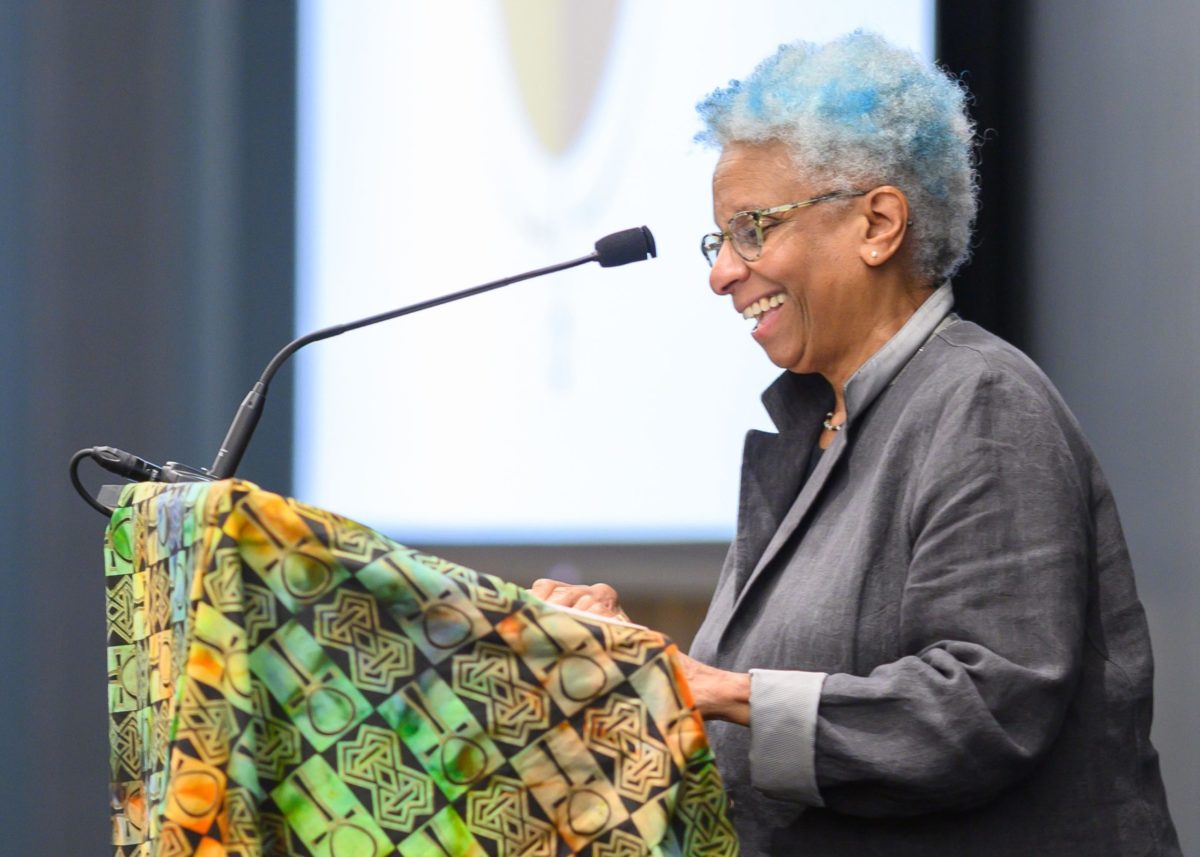The Black Lives Matter movement not only qualifies as an example of public theology — it also exemplifies Christian teaching, a speaker at the University of Notre Dame said Oct. 7.
“To put this in more explicit theological terms, each one sees the other as an icon of the divine transcendent one, as another human made in the likeness and image of God,” said M. Shawn Copeland, professor emerita of theology at Boston College.
Copeland’s Oct. 7 lecture kicked off the 31st annual Black Catholic Theological Symposium hosted by the South Bend, Indiana, university and sponsored by its departments of Africana studies and theology.
The symposium also included two days of private meetings and an invitation-only listening session for Black Catholic students, community members, faculty and staff. Retired Bishop Edward K. Braxton of Belleville, Illinois, lectured Oct. 8 on the Catholic Church and the racial divide in the United States.
The event was to close Oct. 9 with a Mass celebrated by Cardinal Wilton D. Gregory of Washington.
Copeland has been writing and lecturing about Black Lives Matter nearly from the movement’s inception in 2013, when it was founded by activists Alicia Garza, Patrisse Cullurs and Opal Tometi in response to the acquittal of George Zimmerman, a white man, in the Florida shooting death of Trayvon Martin, a Black teenager, in 2012.
The movement turned national in 2014 after the deaths of Michael Brown in Missouri and Eric Garner in New York at the hands of police, and it is now considered a worldwide form of activism against police brutality.
Brown, 18, was fatally shot by a white police officer. Brown was reportedly unarmed but the officer said he was acting violently and he shot him in self-defense. The officer was not charged, but he left the force.
Garner, 43, who also was Black, was arrested for selling untaxed cigarettes. He resisted and died after a white police officer maintained a chokehold on him. The officer was fired and his actions raised questions about the use of force by law enforcement.
Copeland said Black Lives Matter “imagines and forms a new public space … for conversation and interchange,” as well as “creative public action,” and is rooted in the ideas about public theology shared by, among others, Reinhold Niebuhr and the Rev. Martin Luther King Jr.
And what she called its “poetics of testimony” she said, “speaks to the truly true” about extrajudicial killings of Black men as well as those who die at the hands of police.
Although led by Black women, she called the movement “focused on all people. All of the children and youth of every socioeconomic group.”
Copeland, a former woman religious in both the Felician and Dominican orders, said the movement also reflects the words of the Catechism of the Catholic Church in its appeal to conscience: “a sense of obligation in order to do what is right.”
“We are responsible for each other,” she said. “We are responsible for the reality in which we live.”
She called the movement “sharing the bread of experience — drinking the wine of struggle. Black Lives Matter is what theology looks like.”
This year’s symposium comes as new data has made it evident that Blacks are leaving the Catholic Church in unexpectedly large numbers. In February, the Pew Research Center report indicated that only 54% of Black adults who were brought up Catholic continue to practice the faith.
By contrast, 81% of Black adults raised as Protestants have continued that way; for white Catholics raised in the faith, the report indicated that 61% remained into adulthood.
The survey also reported that 77% of Black Catholics said opposing racism is “essential” to their faith.
There are an estimated 3 million Black Catholics in the United States.
The Black Catholic Theological Symposium was founded in 1978 to foster “an ethical community” of scholarly dialogue with a commitment to “the fundamental humanity” of all people; a regard for plurality of cultural, ethnic and religious backgrounds; and the development of “an authentically Black and Catholic theology.”
Spiritan Father Paulinus Odozor, a professor of Africana studies and theology and a member of the symposium, said ahead the gathering it would be “an opportunity to celebrate and to engage academically with the Black Catholic Church in the United States.”
“It is wonderful to bring people to Notre Dame who will address what is happening theologically, pastorally and socially within that church and highlight its contributions to the worldwide communion of Catholicism,” he added.
The symposium’s public lectures by Copeland and Bishop Braxton, the priest said, would help raise awareness of contemporary tensions of racial politics, “highlight possibilities of what can be done and then allow those ideas to take hold in people’s minds.”
“You never really know what those discussions will inspire or what the outcomes will be,” he added.







